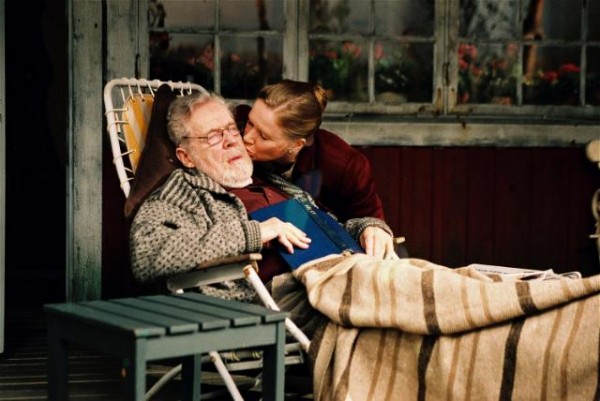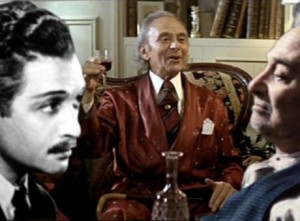From the Chicago Reader (August 5, 2005). — J.R.


Saraband
** (Worth seeing)
Directed and written by Ingmar Bergman
With Liv Ullmann, Erland Josephon, Borje Ahlstedt, Julia Dufvenius, and Gunnel Fred
Broken Flowers
*** (A must see)
Directed and written by Jim Jarmusch
With Bill Murray, Julie Delpy, Jeffrey Wright, Sharon Stone, Alexis Dziena, Frances Conroy, Christopher McDonald, Chloe Svigny, Jessica Lange, Tilda Swinton, and Mark Webber
Ingmar Bergman’s Saraband and Jim Jarmusch’s Broken Flowers are two minimalist features about burned-out individuals picking over the wreckage of relationships they can barely remember and about the special art of not really giving a shit. (A third is Gus Van Sant’s Last Days, scheduled to open here next week.) With its sprawling and far from symmetrical plot, Saraband, made in 2003 for Swedish television, is stark and economical, with a small cast of characters and sparse rural settings, and it seems like an apocalyptic endgame in terms of Bergman’s own career — the end of the world as he knows it. It was shot in digital video, and at Bergman’s insistence is being projected as such — and his peculiar use of that medium is what makes this work compelling.

I wouldn’t dream of contesting Bergman’s status as a film master. Read more
Commisssioned by the bilingual, semi-annual Spanish journal Found Footage Magazine for their second issue, published in April 2016.
One good reason for reposting this essay is that Thom Andersen has pointed out a few errors. I’ve added his comments as a postscript. — J.R.

The rapidly and constantly expanding proliferation of films and videos about cinema is altering some of our notions about film history in at least two significant ways. For one thing, now that it has become impossible for any individual to keep abreast of all this work, our methodologies for assessing it as a whole have to be expanded and further developed. And secondly, insofar as one way of defining work in cinematic form and style that is truly groundbreaking is to single out work that defines new areas of content, the search for such work is one of the methodologies that might be most useful. In my case, this is a search that has led to considerations of two recent videos, Mark Rappaport’s 33-minute I, Dalio—or The Rules of the Game (2014) and Thom Andersen’s 108-minute The Thoughts That Once We Had (2015). Both are highly personal works that also define relatively new areas of on-film film analysis, forms of classification that can be described here as indexing (in this case, indexing and commenting on the career of a French character actor, Marcel Dalio) and taxonomy (in this case, illustrating portions of a taxonomy offered by a French writer, Gilles Deleuze, as applied to a partial and idiosyncratic yet fairly comprehensive history of cinema). Read more




